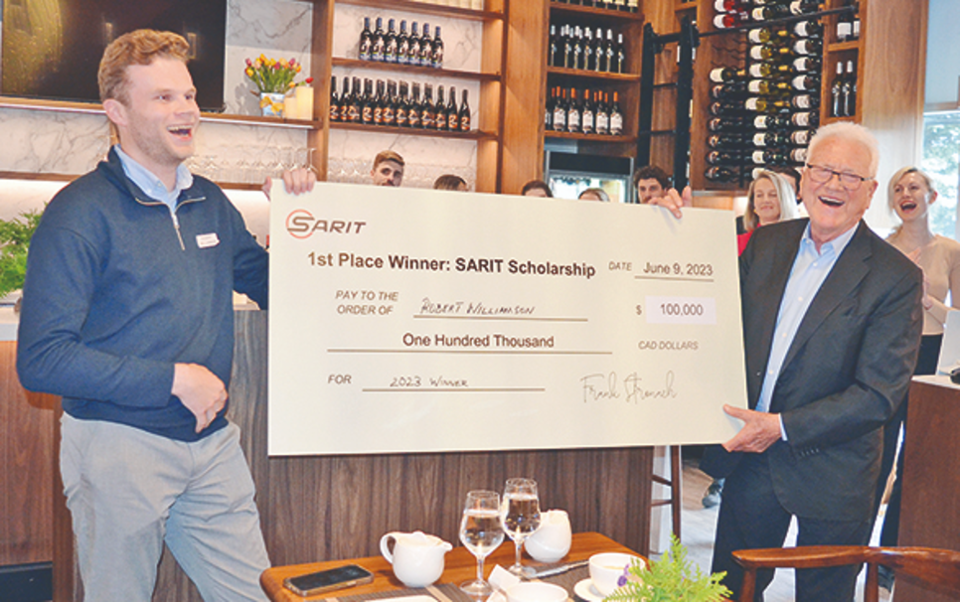Students are always looking to the future, and these visions for the world we want to live in tomorrow were brought together last week by Magna founder Frank Stronach recently who asked university students from across the country what they would do if they were elected Canada’s next Prime Minister.
The SARIT Scholarship Program, named after Stronach’s micro-mobility vehicle produced in the area, aimed to find “the best and most innovative solutions on how we can improve the economy while also improving the environment.”
More than 20 of the essay contest’s finalists were welcomed to Stronach’s Frank’s Organic Restaurant at First Commerce Drive and Wellington Street East on Friday for an afternoon of presentations and speeches from the finalists, a dinner, and, in the end, presentations of cheques for $25,000 for the third-place finisher, $50,000 for second, and $100,000 for the grand-prize winner.
Rachelle Lambert of the Université du Québec à Trois-Rivières came away with third-prize for her essay and presentation on further funding and encouragement of sustainable energy, micromobility, and enabling communities to pursue sustainable initiatives.
Second place was shared by Liam Adamson of Mount Royal University in Alberta with a presentation on Indigenous knowledge and the harmony it fosters between humans and the environment, and by Matrine Rose of the University of Saskatchewan, who presented on the power of harnessing mineral resources to create more batteries for electric vehicles.
Bringing home the top prize was Robert Williamson of the University of Calgary, who focused on the Government’s ability to foster innovation as a way to strike the right balance between the economy and the environment.
“Government policy plays a critical role in determining how our nation responds to environmental threats,” said Williamson in his presentation. “It also determines how our economy performs overall, but often the balance [falls] on one side and we sacrifice one for the other. I believe we can strike a balance between the economy and the environment, and the key to do so lies in the powerful tool of innovation. To achieve any environmental goals, you must either change the technology we use or change how people live their lives, which is easier said than done. The best mechanism to accomplish these asks is through innovation. Economically, innovation is also undoubtedly a key driver in economic growth and prosperity.
“So, if I were the Prime Minister, it would be my goal to maximize innovation by implementing policies that do so and in the process sustainability and economic benefits will also be maximized. Some examples: first I would increase funding to research and development across both private and public sectors. I would also focus on special investments for green tech and sustainable process research. This would spark a wave of innovation in Canada that benefits both the economy and the environment. It would next be my goal to increase participation in the STEM (Science, Technology, Engineering, Math) fields by allocating resources to educational institutions as well as incentivizing and bringing in more skilled immigrants to Canada to join our talent pool of innovators.”
A focus on STEM fields, “breeds new generations of problem-solvers to create new solutions.
“As these solutions come to fruition, new goods and services are created, which increases productivity in our society. Higher productivity means greater output with the same amounts of input, which is essential to sustainable development,” he said. “If I were the Prime Minister of Canada, it would be my goal to maximize innovation and as a consequence both the economy and the environment are enhanced because to solve a problem you have to look at it from the next level… and this is exactly what innovation does.”
Stronach said he feels it’s “important to interface with students” to hear how they would address important questions.
“Our contestants all wrote essays and were fairly close when we compared notes separately,” he said of the judging process. “Robert spoke without notes, he was relaxed, and I think he had a good presentation.”
Williams said he was more nervous waiting for the results than he was making the speech itself.
“This is an incredible opportunity from Mr. Stronach and Sarit and just to hear the next generations and their opinions – I think more companies should do that. I am super-excited – and I’m super-excited because we all get one of the Sarits, too.
“I think everyone had great points. Everyone had the common goal in mind to make Canada a better place. I think everyone had great things to say. The awesome thing was everyone had such diverse views as well, nothing was super-similar.”
— Brock Weir is a federally funded Local Journalism Initiative reporter at the Auroran



